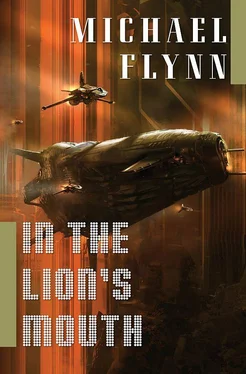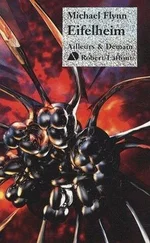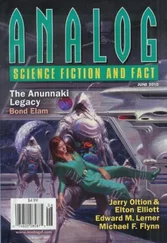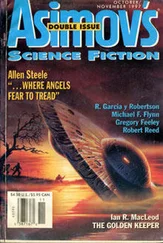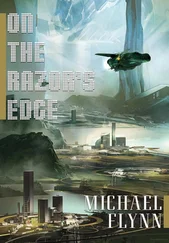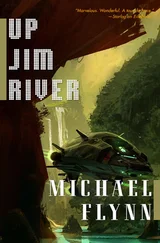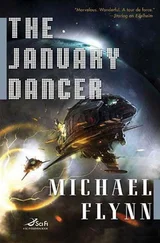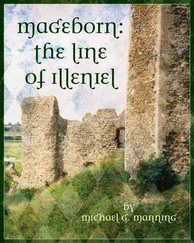An auditor here, a decoding room there, an intelligence office elsewhere—in such wise did the revolution proceed—by promotion, transfer, and untimely passing. Worms were planted in soft wares, so that loyal men unquestioning went forth to do the biddings of their foes. The Protector of Western Sagzenau was shot down by his own bodyguard, acting in the firm belief that such were their orders from above—and who themselves died before the firing squad believing their executioners suborned.
It was the worst sort of civil war, for its primary weapon was deceit and its first casualty, trust.
The Shadows and agents who fought it carefully avoided the pitched battles and guerillas and street-by-street destruction that had marked earlier risings. But there is at least a kind of honesty in storming the barricades—and in defending them. One knows if nothing else where everyone stands. And a head that is “bloodied but yet unbowed” has a certain nobility of cast lacking in that head shaken in incomprehension over an unexpected demotion.
The game proceeded. Pieces shifted about a board composed of stars—threatening here, checking there, protecting elsewhere a pawn or knight. Complexity built upon complexity, intricacies difficult at times for even the players to comprehend. Key pieces were lost. Positions were abandoned. Identities fatally revealed. Or kept! (Grizzlywald Hupp died because his cover identity had been marked for death by a comrade. Even secret wars have friendly fire.)
But what began in grim anticipation had grown to smell more of desperation—or at least of impatience. After twice ten years, even the most eager of rebels might find his enthusiasm thinning, and a certain hunger for results had begun to inform their thoughts.
And so those who must never meet in person had decided that they must meet in person. They had chosen for this purpose the outpost of Henrietta in the remote border province of Qien-tuq. They gathered there from across the CCW: from Dao Chetty and the Century Suns, from Big Dog and the Groom’s Britches, from Hasselbard and Paladin, from worlds of legend and ancient renown. And while they could not hope to meet entirely in secret, they hoped at least to meet where no one paid much attention.
* * *
Henrietta was the sort of world that had betrayed the promise of her youth. The lushness of her terraformation imbues the visitor with awe at the powers of the old Commonwealth of Suns—or would have, had Henrietta visitors to awe. Her verdant hillsides ache for the plow, her splendid vistas for the well-sited villa. Her broad, gleaming rivers want earnest industrious traffic and even more earnest fishermen. By rights, the planet should have been thickly settled centuries since.
But she sits hard by the border with the Peripheral League, and her strategic value is too great to pimp herself as a tempting prize. She dare not be too wealthy, too prosperous, too desirable, lest she invite attack—by the pirates of the Hadramoo, if by no one else. Yet here and there stand ancient ruins, tumbled reminders that there had once been a different age, when no borders ran through the worlds of men.
Like a promising young woman who has settled for a lesser beau, Henrietta has been rimmed in steel and not in verdure. Grim men stand guard along the walls of the world. Fortresses orbit o’erhead, and burrow deep within her vales. Corvettes hold station at the Visser hoops of her roads, even the narrow, minor stream known as the Tightrope.
Of course, no one attacks. No one has ever attacked; and the thought that the sprawling, barely United League of the Periphery could muster enough common purpose to do so has grown every year less likely. But the pretense that they might still do so serves a purpose, and the garrison acts as garrisons always have when bored in their duties. They are far enough from Dao Chetty to feel the slack in their tethers. The natives of Henrietta, heirs to obsolete traditions, find the boots of the garrison heavy on their necks; but they cannot remember a time when those soles did not rest there, and most have forgotten that it had ever been otherwise.
The garrison, for its part, knows both to apply the pressure and withhold the worst. What fool kills the cow he milks? All told, the garrison commander has told his staff, it was nice to lie doggo in a corner and be forgotten by those in power.
* * *
And so a certain unease grew in the heart of Swoswai Mashdasan as he reviewed the Ten-day Reports. A visitor from off-world named Egg Mennerhem had been accosted by two ratings on groundside leave from WŠ Gentle Caress. Touristas being targets of opportunity, they had pressed of him a donation to the Astral Shore Leave Benevolent Fund and, in the ensuing discussion, each had broken an arm. Boots did not always get the better of these little extortions, but they usually did at two to one. That made Mennerhem a Person of Interest.
MILINTEL was set to watch the tourista and reported back the curious fact that he took none of the day tours to the Commonwealth Ruins in the nearby Gyorjyet Narrows, the only conceivable reason why a tourista might come to Riettiesburg in the first place, but he remained idly content in the Grand Khyan Hotel.
That was bad enough. But it was as the first raindrop before a storm. Others followed in a quickening drizzle, arriving by ones and twos, never overtly acknowledging one another, but congregating as if by accident here and there—in the hotel lobbies, in the restaurants, casually on the street corners and in the parks. They came by packet and they came by liner and they came by monoship. Mashdasan’s agents watched—and the touristas grinned and watched MILINTEL watching them.
The conclusion was soon inescapable.
They were gathering.
* * *
Dawshoo Yishohrann waited until he was certain that everyone who was coming to Henrietta had come. If the absence of some of his allies, indeed of some of his staunchest allies, disturbed him, he gave no sign to the others. He was affable at meals, engaging in his conversations, suitably grave at the reports delivered in face time. Those missing had undoubtedly excellent reasons. Death, perhaps; or, like Olafsdottr, a special assignment. In the meantime, he showed his teeth to everyone and gave reassuring shoulder claps to the more disheartened. Dawshoo was wide shouldered and possessed a hooked nose of impressive scope, so that he was known quietly as “the Beak.” Some called him arrogant; others called him less arrogant than he had a right to be. His enemies said that self-interest was his guiding principle, but his friends pointed out that he had risked and lost both wealth and position to lead the rebellion. He was a marked man; and a dead one if the Long Knife ever found its mark.
For his own reassurance, the Beak sought the company of Gidula. Whether the old man had any other name, Dawshoo did not know. The name had resonances of torture in one of the ancient tongues of men, so it may have been an office-name and, as the office had consumed the man, so the name had consumed his identity. But any random combination of phonemes could find kin in some old language, and office-names were less common in the Confederacy than among the Peripherals. In any case, Gidula had grown old in a service little known for longevity. If that did not mark him wise, it at least marked him nimble.
The two met by prearrangement on the terrace of a small restaurant in the Skimkhorn district of Riettiesburg. The kitchen boasted the cuisine of the Century Suns, though it was an empty boast. Perhaps at some remote time, a Centurion had been assigned to Henrietta and had afterward received permission to remain. If so, his family recipes had suffered over the generations. Dawshoo was a native of Alpha, the Big Sun, and knew whereof he spoke.
Читать дальше
